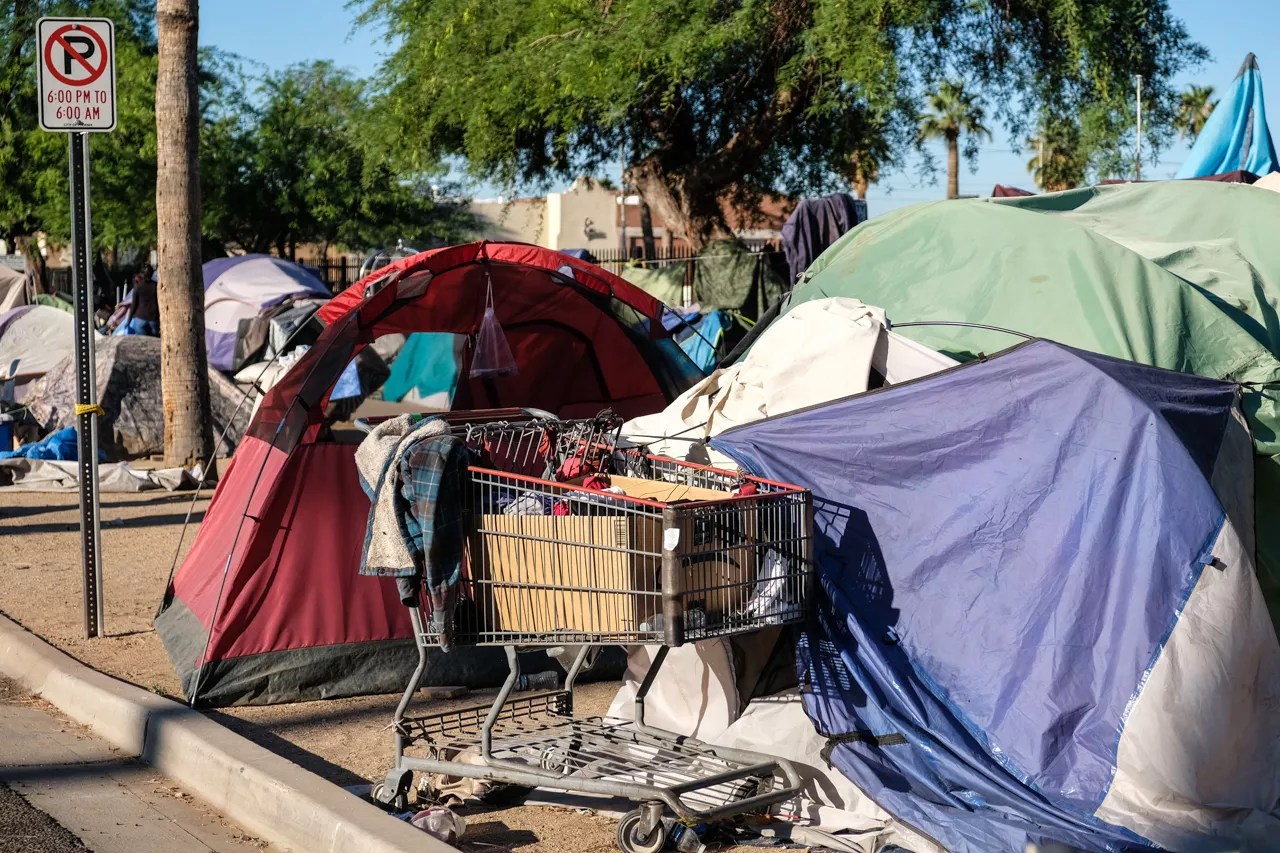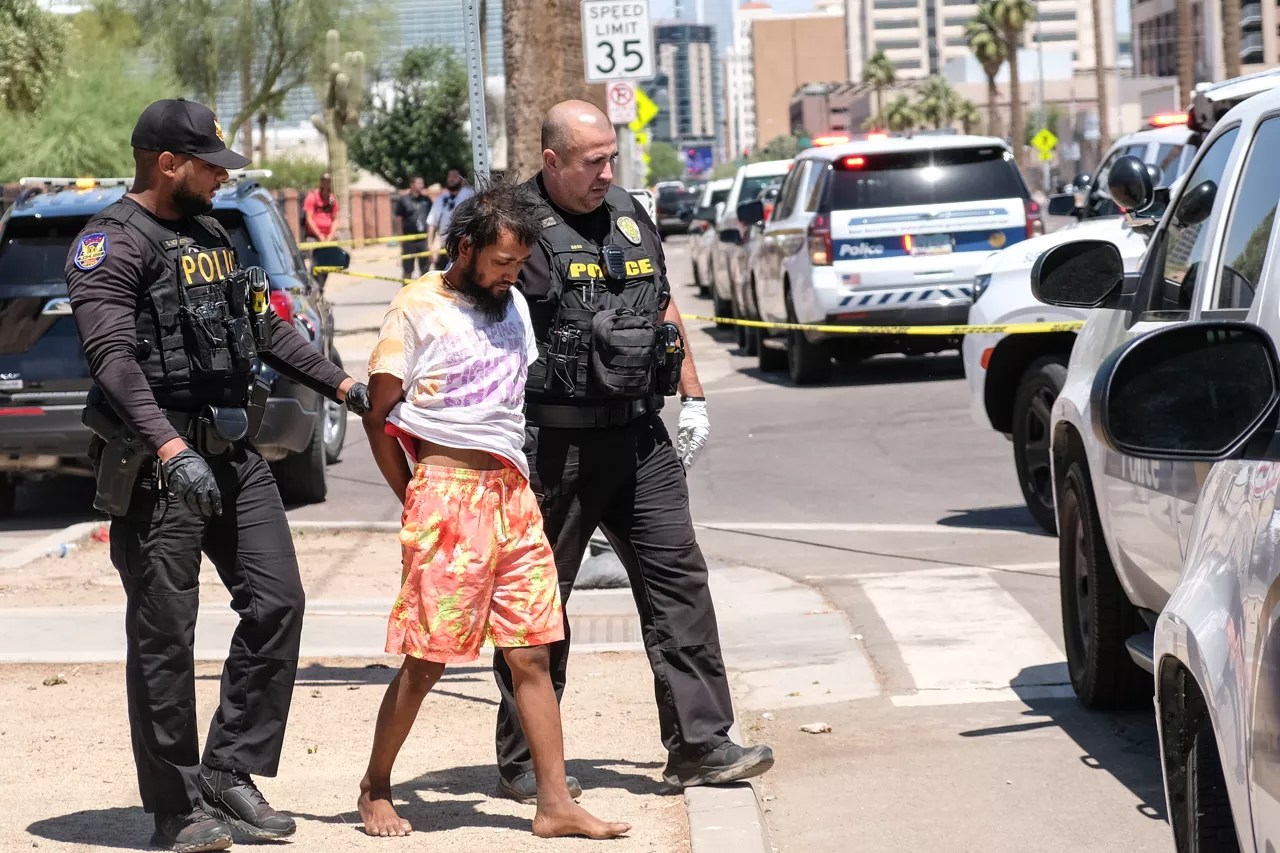
Katya Schwenk

Audio By Carbonatix
The fate of one of the nation’s largest homeless encampments – the Zone in downtown Phoenix – now rests in the hands of a Maricopa County Superior Court judge.
Earlier this week, lawyers for a group of property owners in the area of the encampment made their case before Judge Scott Blaney for why he should give the city a final deadline to clear out the encampment. Blaney now has 60 days to make a decision, although he suggested on Tuesday that the ruling will come down in early August.
The trial laid bare the city’s failure to address the inhumane living conditions of Zone residents as well as the safety concerns raised by property owners who filed suit in August 2022. Now, the city is scrambling to appease the business owners, while hundreds of people in the encampment languish in the deadly Phoenix heat with no available shelter.
“If 800 people were displaced by a wildfire or a flood, the city would provide temporary shelter,” said Steve Tully, one of the attorneys representing the property owners. The city would “start triaging” and take immediate action, he said.
By contrast, Phoenix’s unsheltered population has been living on the streets of the Zone for years.

A Phoenix police officer stands in the Zone during a confrontation on May 31.
Katya Schwenk
Twin legal battles
Over the past year, the city has been dragged into multiple legal battles involving the Zone and its treatment of the camp’s residents. The trial was just the latest chapter in a lawsuit – Brown v. City of Phoenix – filed on Aug. 10, 2022 by a dozen property owners in the area of the Zone, which stretches from Ninth to 15th avenues, between Washington and Jefferson streets.
The 57-page complaint called the encampment a “public nuisance” under Arizona law that has “irreparably harmed” those who have property or work in the area, and demanded the court order the city to clear it. Residents and business owners regularly suffer break-ins and have had to close businesses due to the expanding encampment, according to the suit.
At one point, as many as 1,000 people lived in the Zone, although in recent months the number has decreased to around 800, according to testimony during the trial. During the summer, people who have pitched tents along the streets here have no respite from the sun and limited access to potable water and showers.
The situation in the Zone has changed significantly since March 27, when Blaney gave the city a July 10 deadline to clear out the encampment. The city began conducting sweeps on May 10, despite a lack of available shelter beds and an ongoing lawsuit filed by the ACLU of Arizona and the Fund for Empowerment. The suit, which was filed in November, claimed the city had destroyed personal property in previous sweeps.
Justin Pierce, an attorney representing the city, said on Monday that the two lawsuits mean that the city has been “walking a legal tightrope.” Brian Freudenthal, a Phoenix police commander who oversees operations in the Zone, put it this way: “One court is saying we’re doing too much, and the other court is saying we’re not doing enough.”

Joel Coplin is one of a dozen plaintiffs in the Brown case against the city. Coplin, an artist, lives and works in a warehouse in the Zone.
Lynn Trimble
Property owners ask judge for a deadline
During the trial, property owners and the city agreed on some points about the Zone:
- The city has allowed people to permanently camp in the area.
- The city has cleared three blocks of the encampment since May, but the number of people living there remains the same. (A fourth block was cleared on Wednesday.)
- Living conditions for people in the area are poor and sometimes deadly.
The questions of the trial, which emerged as lawyers sparred in their opening statements, were more bureaucratic. Should Blaney give the city a final deadline to clear out the Zone, and who should continue overseeing the city’s actions in the neighborhood?
For Zone property owners – who are represented by Ilan Wurman, an attorney and associate professor at Arizona State University, and Tully – the city’s efforts are too slow and strictly a result of a March court order. During the hearing, Wurman emphasized that “the city is the cause” of the problems surrounding the Zone. Therefore, he argued, the court should make its order forcing the city to permanently clear out the neighborhood “by the end of the summer.”
The city, meanwhile, maintained that it needed nine more months to finish clearing the Zone, which officials testified that they plan to continue regardless of the outcome of the trial.
“We are invested, as a city, in addressing this area around the Human Services Campus – for these people out there that are unsheltered, but in particular, for these property owners, homeowners, business owners,” Gina Montes, deputy city manager for Phoenix, testified on Tuesday. “We are all in. We have been working for many months, and we are not going back.”
Montes’ statement was met with skepticism from the plaintiffs and their lawyers.
As Blaney noted, the city was not conducting regular “engagements” – its term for the sweeps – until the judge’s order came down in March. “Yeah, things were, quote-unquote, in the works. But things were not done until we got into this case. That’s the bottom line,” Blaney told the city’s lawyers as the trial came to a close on Tuesday.
This was a key takeaway of the trial. Before the lawsuit, the city had done far less to provide shelter to the many living outside. And the question remains: What is the city doing now?

Police arrested a man after he refused to leave the Zone during a sweep on May 31.
Katya Schwenk
City promises a sanctioned campground
Over the two days of the trial, the city attempted to prove to Blaney that it was following his order to clear out the encampment. Numbers the city provided as exhibits in the trial showed that some 200 people had been placed in shelters as a result of the Zone sweeps since December. However, the city did not provide data on how many of those people remain sheltered. In June, the Arizona Republic reported that some of those shelter placements were only temporary.
According to testimony by city officials, three blocks of the Zone were cleared before the trial, with 14 blocks remaining. A fourth sweep took place on Wednesday, with a fifth set for later this month. For the most part, people have not returned to camp in the areas that have been cleared, which the city claimed was a success.
“Those areas that we have addressed – it’s not as fast as we would like, as I know the plaintiffs would like – but they have remained clear. They have remained clean,” Montes said. “Twenty-four of those folks we encountered and we engaged with chose to go somewhere else in the area.”
The city is clearing the Zone block by block in large part because of a 2018 decision by the Ninth U.S. Circuit Court of Appeals, which held that it is unconstitutional to arrest or otherwise punish people for sleeping in public when they have nowhere else to go.
To address this, the city leased land from the state and plans to create a “sanctioned campground,” or an area for people to camp outside, with security and basic amenities such as bathrooms and showers. The city currently is branding the campground as a “safe outdoor space,” though people there will still be camping outside in triple-digit heat.
The campground will be located right on the outskirts of the Zone at 15th Avenue and Jackson Street.
Montes testified that the city was moving “aggressively” to open the campground but said that plaintiffs’ requests that the city clear out the Zone by the end of the summer were not possible. “It is not feasible or realistic for us to do it in that short a time period, while at the same time complying with requirements in the federal Fund for Empowerment/ACLU case,” she said.
Lawyers for the property owners, meanwhile, urged Blaney to set a shorter deadline. “Why should our clients suffer for another nine months while the city gets around to it?” Tully asked in his closing statement.
The hundreds of people living in the Zone as summer continues are suffering, too.